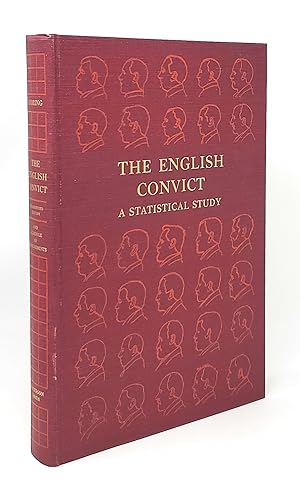goring charles pearson karl driver (1 risultati)
Tipo di articolo
- Tutti gli articoli
- Libri (1)
- Riviste e Giornali
- Fumetti
- Spartiti
- Arte, Stampe e Poster
- Fotografie
- Mappe
-
Manoscritti e
Collezionismo cartaceo
Condizioni
- Tutte
- Nuovi
- Antichi o usati
Legatura
- Tutte
- Rilegato
- Brossura
Ulteriori caratteristiche
- Prima edizione
- Copia autografata
- Sovraccoperta
- Con foto
- No print on demand
Paese del venditore
Valutazione venditore
-
The English Convict: A Statistical Study (Unabridged Edition)
Editore: Patterson Smith, Montclair, 1972
ISBN 10: 0875851371ISBN 13: 9780875851372
Da: Underground Books, ABAA, Carrollton, GA, U.S.A.
Libro
Hardcover. Condizione: Very good. Hardcover. 12" X 8 1/4". xx, 528pp. Very mild rubbing and shelf wear to covers, corners, and edges of red cloth over boards. Pages are clean and unmarked. Binding is sound. This book is heavy and oversized and will require additional postal charges to ship internationally. Please contact us today for an international shipping quote. ABOUT THIS BOOK: The founder of the Positive School, the creator, and most famous exponent of its doctrine, was the late Professor Cesare Lombroso: an Italian of genius, an indefatigable worker, and a man of strong personality, attracting to himself many disciples and co-workers from all countries of Europe. Lombroso's distinctive merit lay, not in his scientific study of the criminal, but in his humanitarianism in the in?uence he exerted towards ameliorating the lot of the criminal. All thinking people to-day, legislators and judges, as well as the general public, the morality of the age, as well as the voice of science, attest the truth which Lombroso was the first to enunciate as the fundamental principle of criminology and penology the principle that it is the criminal and not the crime we should study and consider that it is the criminal and not the crime we ought to penalise. The father of criminal anthropology he has been called, with some appropriateness but, if the title survives, it will, in the future, be associated, not with Lombroso the anthropologist, but with Lombroso, enunciator of the humane truth that iniquity and righteousness depend upon what an individual is, and not upon what he does the prac tical corollary of this truth being that, in dealing justice to him, we must understand the criminal both as he is in himself, and as he becomes through the influence of environment.(Excerpt from the book).


